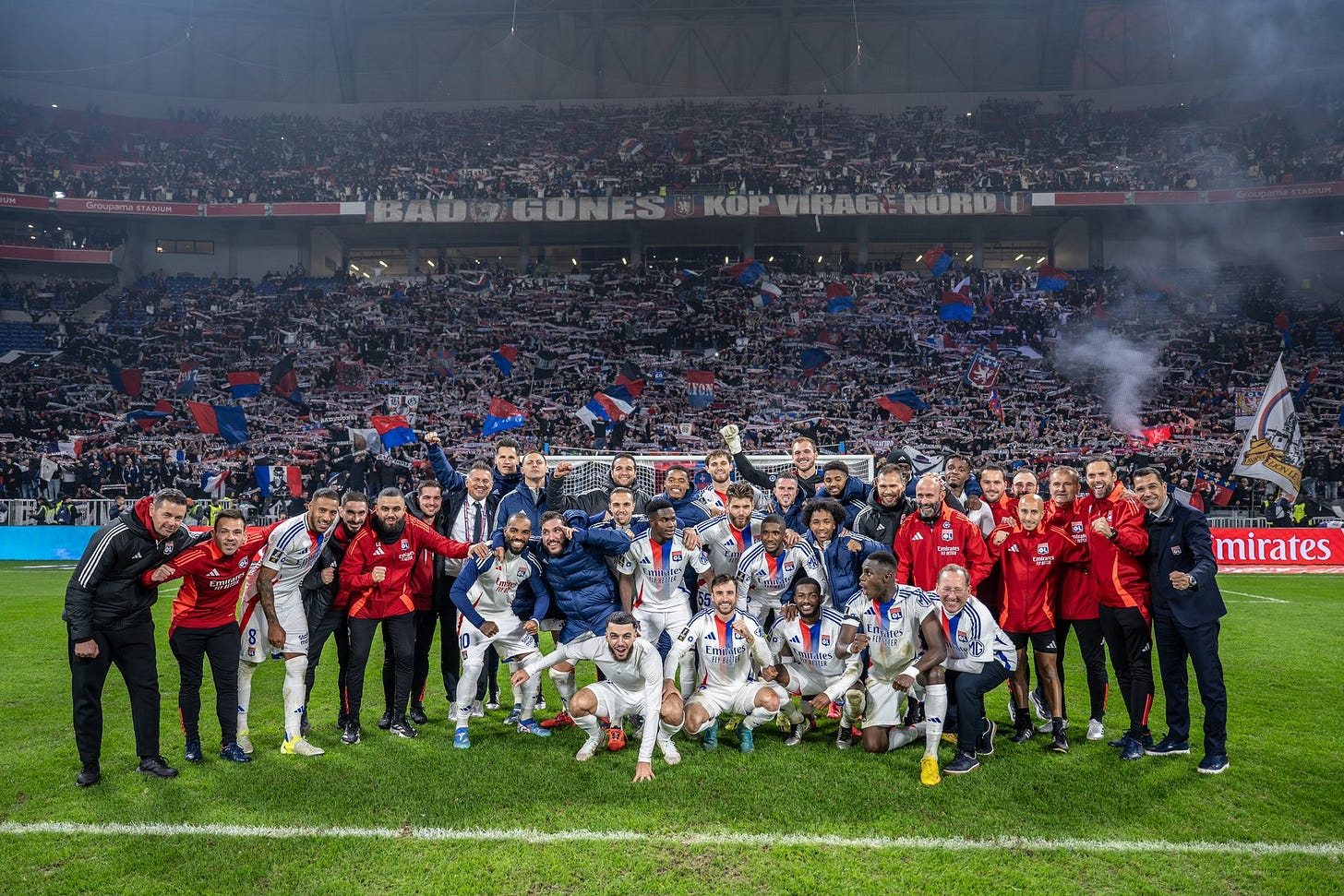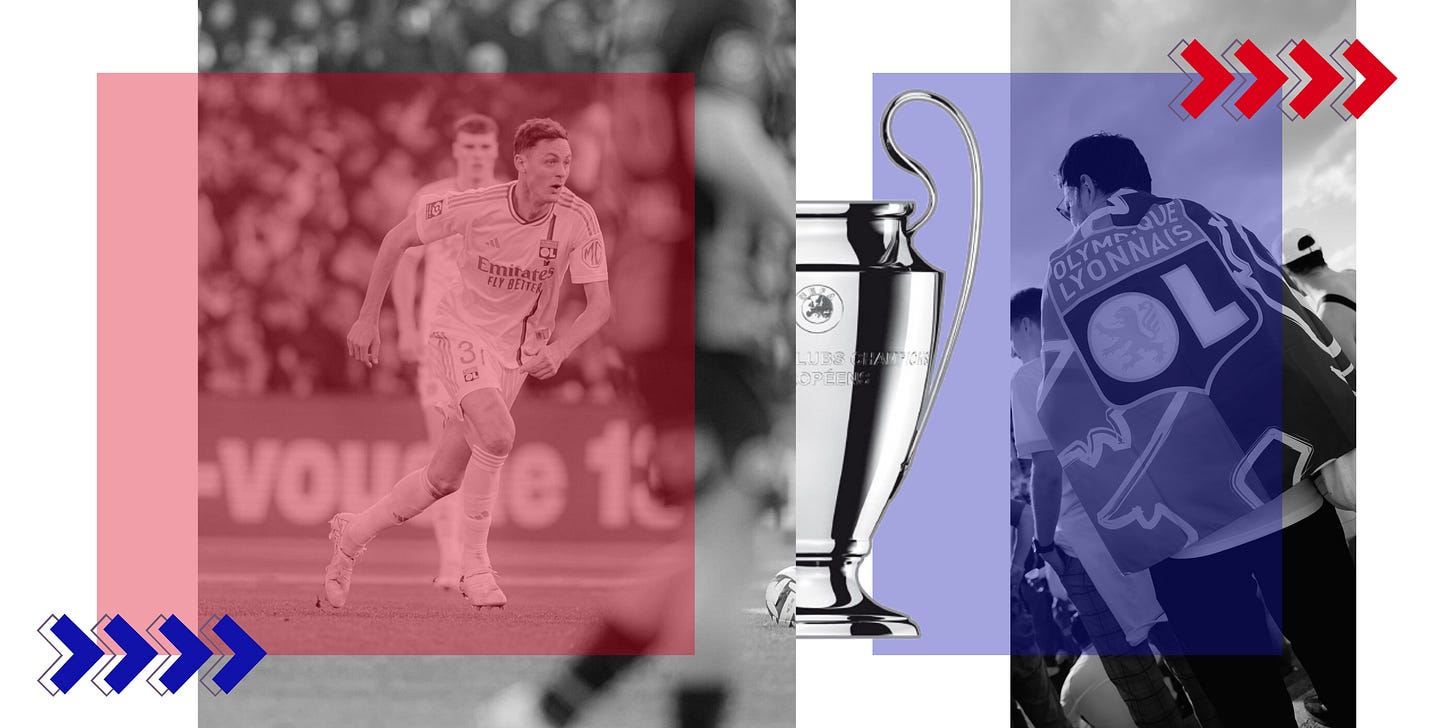Lyon's financial struggles: Media revenue and Champions League hopes at risk
Première Partie: The Asterisk takes a look at how Lyon’s most important revenue streams, from both European competitions and Ligue 1, could be impacted.
Part 1 of a series on Olympique Lyon’s finances.
Olympique Lyonnais has been chasing a Champions League berth to address its financial difficulties. However, its economic hardships could be gaining the upper hand in the tug-of-war and might even drag the club to the second division of French football.
France’s football financial watchdog, the DNCG (Direction Nationale du Contrôle de Gestion), slapped the historic club with a provisional relegation to Ligue 2 and a transfer ban due to ongoing financial issues. The club has until the end of the 2024/25 season to iron out its economic struggles.
Owners Eagle Football Group’s latest accounts revealed that the French club’s debts stood at €505.1 million (£420.4m), up from €458.5 million (£381.6m).
The John Textor-led Eagle Football Group also owns Crystal Palace, Botafogo (Brazil), and Racing White Daring Molenbeek (Belgium).
The American businessman took control of Lyon from Jean-Michel Aulas in 2022.
When nightmares come to life
Every club or organisation outlines potential risks to its business in financial reports. Seeing these risks materialise is a nightmare no owner wants to face.
A large portion of Lyon’s revenue and business success hinges on the club’s on-pitch performances, particularly income generated through media, marketing rights, and ticketing.
“This is because the amount of media and marketing rights revenues is largely determined by the club’s match results, and particularly by whether it remains in Ligue 1 and participates in European competitions,” reads section 3.1 of the 2022/23 annual report that lists the risk factors that could impact business.
While it may be normal for organisations to list worst-case scenarios, the possibility of not playing in Ligue 1 sounds ominous, especially for a team that once dominated French football, winning seven consecutive Ligue 1 titles from 2002 to 2008.
“The Group is unable to guarantee the consistency of such performance in future years.”

Eagle Football Group has little control over how things unfold on the pitch, due to player unavailability, potential injuries, suspensions, or below-par performances.
“Failure to qualify for a European competition or relegation to Ligue 2, the second division of France’s football league, would have a significant impact on the media and marketing rights earned by the club and on its reputation,” Lyon warned.
A demotion to Ligue 2 would automatically disqualify Lyon from the Champions League, further exacerbating their financial woes and jeopardising their already slim chances of qualification for top-tier European competitions.
“As a result, a downturn in the club’s results on the pitch could have a significant adverse impact on the club’s revenue and reputation. Specifically, given that the club’s Ligue 1 ranking at the end of the 2022/23 season did not qualify it for a European competition in 2023/24, the Group will be deprived of UEFA media rights and European Cup ticketing receipts.”
Très importante: Media and marketing revenue
Lyon has six principal sources of income: matchday ticketing, media and marketing rights, sponsoring and advertising, brand-related revenue, events, and player trading.
Media and marketing rights income increased by €10 million to €95.4 million in 2023/24.
While the latest annual result provides a snapshot of Lyon’s current finances, the Universal Registration Document of the 2022/23 season provides a clearer breakdown of the income.
Lyon’s media and marketing rights totalled €85.3 million (£70.9m) in 2022/23. These funds were distributed to Lyon by the LFP (Ligue de Football Professionnel - governing body that runs professional football leagues in France), the FFF (Fédération Française de Football), and UEFA. The money comes from the sale of broadcasting rights to TV channels and media companies for airing the matches.
€84.1 million (£69.9m) of this money was paid by the LFP and FFF. This includes €45.3 million (£37.7m) from a special financial deal between the LFP and private equity firm CVC. The Luxembourgish company invested €1.994 billion (£1,659b) into La Liga to enhance the global growth of the Spanish league and its clubs.
€1.3 million (£1m) was linked to income generated from UEFA. Even though Lyon failed to qualify for any European competition that year, the club will have received a solitary payment from UEFA.
First division clubs that are not participating in the UEFA competitions are entitled to this payment. The scheme was launched ‘to strengthen the financial stability of European football,’ according to UEFA.
For clubs like Lyon, competing against Europe’s biggest giants isn’t just about prestige; it underpins financial stability, boosting matchday and broadcasting revenues.
Champions League: Big ticket out?
The club’s most important sporting objective has been to play in Europe, according to its annual report for the 2022/23 season.
“European competitions generate significant revenue for participating clubs, in particular from media and marketing rights, as well as showcasing the talent in their playing squad,” the club highlighted in the report.
With the DNCG’s latest ruling, the stakes are much higher. Lyon would have to forgo two of its most significant revenue sources.
UCL: €2.467 billion to be distributed among clubs
Every European club would love to play in the Champions League. While competing on the continent's ultimate stage can bring any team glory, it also brings significant financial rewards. Substantial amounts of money.
“The annual amounts paid by UEFA to clubs participating in the two European competitions (UEFA Champions League and UEFA Europa League) have increased substantially, making the UEFA Champions League the most attractive competition for clubs in terms of both sports and finance,” states section 5, which includes the business overview of the club.

This year marked the beginning of the new Champions League format, breaking away from the traditional group stage competition to an expanded league phase. The number of teams has increased from 32 to 36.
UEFA expects to earn a combined €4.4 billion (£3.7b) from the Champions League, Super Cup, Europa League, and Conference League.
After deductions, which include administrative costs, solidarity payments, clubs eliminated in the qualifying rounds, as well as the Women’s Champions League and Youth League, UEFA will have a net revenue of €3.548 billion (£2.9b) to distribute among teams participating in the Champions League, Super Cup, Europa League, and Conference League.
Of the €3.548 billion, a further 6.5% will be reserved for European football and remain with UEFA.
Lyon will bag a fraction of the €565 million (£470m) since they play in the Europa League.
Lyon could lose big with Ligue 1 demotion
On the national level, the club generated a significant portion of its media revenue in 2022/23 through Ligue 1 media rights, but relegation would mean that amount would shrink considerably.
A small portion of the income from TV rights in Ligue 1 is redistributed to Ligue 2 clubs. But what would that look like in numbers?
According to the 2022/23 season, if Ligue 1 generated €500 million in revenue, 81% of this money would stay within the top division, and 19% would be shared with Ligue 2 clubs.
If Ligue 1 makes between €500 million and €600 million, all the extra money will stay with Ligue 1 clubs, and the teams in the lower division do not earn any extra francs.
If Ligue 1 earns above €600 million, 90% of the extra money stays in France’s top-flight league and 10% is shared with Ligue 2 clubs.
Money drawn from international TV rights follows a similar structure.
Losing its Ligue 1 status, a competition that has played a key role in compensating for the absence of European participation, would significantly increase its financial burdens.
Les Gones currently sit fifth in the league with 18 points in 11 games, occupying a Europa League spot. Opta’s latest final league positions project Lyon to finish seventh, outside the European spots.
Apart from refinancing the debt, the leadership will have to make tough decisions, such as selling players, which could directly impact on-pitch performance, implementing cost-cutting measures, and possibly even selling stakes in other clubs owned by Eagle Football Group.
Vultures are already circling over Lyon’s most exciting players, such as Rayan Cherki.
OL president John Textor will demand a substantial fee.
“We lost €15 million from his sale last summer… but his value is now way higher,” said Textor via Fabrizio Romano on X. “He should stay in January, but it’s up to Rayan; he decides what he wants to do.”
Up next: An analysis of Lyon’s latest financial accounts.
Related stories:
The financial state of Bordeaux FC: Insights and what lies ahead
French club Bordeaux gave up its professional status following years of financial struggles. The Asterisk takes a look at the former Ligue 1 champions’ latest club accounts and the bleak future that lies ahead.






